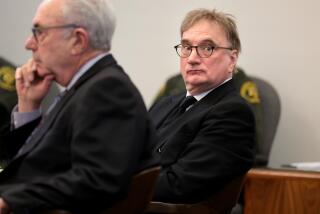Bechler Takes Stand in Wife’s Death: ‘I Never Harmed Her’
- Share via
Defending himself publicly for the first time, a Newport Beach man told a jury Thursday that he did not kill his wife during a 1997 boating trip and that when he told his girlfriend he did it was a lie meant to impress her.
In the most dramatic moment of a six-week murder trial, Eric Bechler took the witness stand to explain his wife’s mysterious disappearance at sea--and several incriminating statements he later made to his girlfriend.
Although Bechler denied hurting his wife, Pegye, he admitted that ongoing fights with her once led him to tell a friend he wanted to “dump her in the ocean.”
Bechler, 33, is accused of killing his wife in a rented speedboat July 6, 1997, dumping her in the ocean and then concocting a story that she accidentally fell overboard.
With the courtroom so full that bailiffs closed it to the public, Bechler told the jury of seven women and five men that his wife vanished from the boat while towing him on a bodyboard.
“I did not kill her. I never harmed her,” Bechler said.
Bechler explained that he wiped out while trying to knee-board, surfaced from the water several seconds later and saw the boat spinning circles and his wife missing. Her body was never found.
Under cross-examination, Bechler said he couldn’t tell whether his wife was seated or standing while steering the boat.
“Is that because she wasn’t pulling you when she disappeared?” asked Deputy Dist. Atty. Debora Lloyd.
“No. That’s not true,” Bechler replied.
Dressed in a sky blue, button-down dress shirt and tan slacks, Bechler answered questions in a soft, polite tone.
He spent much of his testimony explaining secretly recorded statements to Tina New, a “Baywatch” actress who moved into his ocean-view home three months after his wife’s disappearance.
Bechler admitted telling New he killed his wife, but said he did so only after she prodded him in a seductive tone after a night of drinking and drug use that left him feeling like a “space cadet.”
When he initially told New that his wife’s death was an accident, she grew angry and told him that she knew he beat her to death and dumped her in the ocean. Bechler said he eventually agreed with the woman to calm her down.
“I felt she was attracted to that type of person. I wasn’t enough of a risk for her,” Bechler said. “It was a sick thing to do. I just agreed to satisfy her fantasy.”
New later revealed the October 1999 admission to sheriff’s deputies, then wore a hidden wire and recorded Bechler making implicating statements about his wife’s death.
Lloyd told jurors at the outset of the trial that the Bechlers’ marriage was in shambles and that Bechler killed his wife in the hopes of cashing in on her $2-million life insurance policy. Although Bechler was not arrested for more than two years after his wife’s disappearance, the insurance company refused to pay him.
The prosecutor has traced many of the couple’s troubles to March 1997, when the two were fired by the company who bought their physical therapy business. It was in that month that Bechler admits telling his best friend that he was so angry he could dump his wife in the ocean.
“I simply said I was so mad I could throw her off a boat,” Bechler said. He said he never seriously considered killing her.
Bechler took the witness stand shortly after Judge Frank F. Fasel rejected a defense motion to dismiss the case because of questions about whether the killing took place in California territory.
Defense attorney John Barnett had argued that the case should be dismissed because of testimony that the alleged killing occurred 8 to 12 miles out to sea, beyond the state’s three-mile jurisdiction.
Fasel ruled that the three-mile boundary starts at Catalina Island. He also ruled that evidence suggests that the crime was well underway by the time Bechler boarded the boat with his wife in Newport Beach.
While testifying, Bechler often made eye contact with the jury, politely addressing his answers directly to the people who will decide his fate.
At times, however, exchanges between him and Lloyd grew testy. The prosecutor pressed him about the couple’s finances and asked whether he was angry that his wife owed him money for paying their monthly bills.
“I knew she wasn’t going anywhere,” Bechler said.
“Not for a while,” the prosecutor replied.
More to Read
Sign up for Essential California
The most important California stories and recommendations in your inbox every morning.
You may occasionally receive promotional content from the Los Angeles Times.












